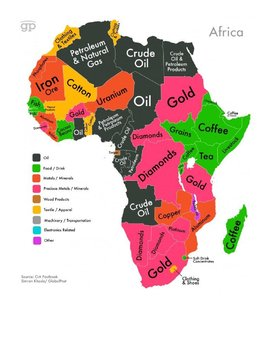Amidst the plethora of blooming cities in Africa, the central harvest must be culture. Across the 54 countries, an important factor that connects the people is that of culture. Development and culture have been coined as mutually exclusive for decades, however in order to emulate true continental progress that is sustainable, cultural norms and traditions must pertain in the face of the transition towards modernity.
Undoubtedly, the nature of economic development seeks to quantifiably analyse policies and factors of influence over certain periods of time. As such, indicators such as GDP and GNI commonly surface when calibrating how nations track their advances. Interestingly, the culture determinant of economic progress is much harder to quantify, though it is incredibly interconnected to overarching aims of African progress, and must be considered. Difficulties in assessing causal relationships then arise because of the disconnect between retaining cultural practices as a tandem to measuring economic progress.

Qualitatively and according to economic theory, culture refers to the ,,‘customary beliefs and values that ethnic, religious, and social groups transmit fairly unchanged from generation to generation’. Though fairly broad and encompassing, the concept of time emphasises a focus on causal relationships that can be assessed and therefore quantified. However, culture is a process that encompasses familial values, learning, skills, individual comprehension and style. Additionally, culture is not constant over time- as seen through the urbanisation process across the world, there is an ever struggle between maintaining tradition and moving towards modernity. This takes shape in many developing countries in the continent as people tend to locate inwards to the business districts and capital heavy areas where opportunity for advancement is plenty. A trend that is shared between the West and in Africa is this migration for employment, so where does culture then fit in? Ushering in the question about whether culture is simply a mask for other factors that are at play in the quest for development.
Indeed, cultural tradition is a deeply entrenched institution amongst all the countries in Africa and societies differ in the ways that the norms are integrated into daily economic activity. In this manner, development must reflect a fine and delicate balance between expanding opportunities for rising income and adopting values or traditions that are contextually compatible. There is an argument following the train of thought that geographical and environmental conditions are more significant in economic development, and should be focussed on as the main causes for underdevelopment. This implies that natural resources

and geography serve as explanations for the differences between the development timelines of global nations, but in Africa many exceptions surface that provide strong backlash against that reasoning. Take the diamonds and gold, to name a few resources, the former is plenty in Angola, Botswana, Sierra Leone, DRC; while the latter can be excavated in South Africa, Benin, Burkina Faso, Mali and Tanzania. Therefore,the state of some of the world’s most destitute countries can not be solely attributed to geography and resource abundance. So where does culture fit into the model? How can we look at examples from the West and translate them to match the cultural fluidity to inform the next steps for Africa?
One conclusion recently brought to light by renowned economists Esther Duflo and Abhijit Banarjee explains the idea that a Western model of development cannot and will not succeed for true sustainable development in Africa. In this regard, a copy- paste tool of success stories will inevitably fail in the long-term. Cultural aspects can be then used creatively and innovatively in order to provide positive outcomes of development, rather than delaying progress. Many SMEs across the continent have proven that hard work, commitment and loyalty are cultur
al values that align with strong economic progress. Take the example of SafeBoda, a transportation enterprise that started in order to, ‘modernise the informal transportation industry by ensuring safe access to mobility.’ As a spin- off of Uber, Lyft and Bolt, SafeBoda uses the local popularity of motorcycles as a transport me

dium to reduce the number of accidents while generating profit at the same time. Another example is that of foreign corporations that find investment opportunities in Africa, wherein great working spirit and values of discipline have been generated amongst the teams. This can be seen in the mining corporations in South Africa and Zambia. On a more individual basis, innovation and entrepreneurship is blossoming quickly across the continent as many people have developed a taste for individual businesses that have unique niches. As a result, many African people have seen a rapid growth in small economic sectors and business acumen.
As a consequence of colonisation, as Christianity and modernity took over traditional cultural values, interpersonal trust as well as trust in the public sector was weakened. Trust is an integral cultural strength for successful commercial ventures. Corruption is still at large and for the many informal communities, social benefits for welfare cease to exist in reality. Unemployment runs rampant, healthcare and education disparities are increasingly apparent and food insecurity still exists. Trickling down into businesses, trust is selective. Family- owned businesses tend to err on the side of extreme caution, keeping things close to the blood relations, rather than being more open and transparent to partnerships that can boost growth. On an even smaller scale, professionals that may share facilities prefer to work individually and seek single- minded solutions, rather than working to share group growth.
On an optimistic note, cultural norms of music and film are becoming increasingly poignant in developing countries. Companies have wholeheartedly embraced creativity, innovation and culture to create beautiful pieces of art. A lot of films and short movies depict important historical stories, such as the fight against apartheid in South Africa- Mandela: Long Walk to Freedom, the liberation movements in Congo: Lumumba, and the slave trade: 12 Years A Slave. According to former UNESCO Director- General Koichiro Matsuura, “films and video production are shining examples of how cultural industries, as vehicles of identity, values and meanings, can open the door to dialogue and understanding between peoples, but also to economic growth and development” (2009). Not only does cinema provide an avenue for African stories to gain global recognition, but also a way for Africans to express their cultural identity. The film industry can be a significant capital venture, as seen through Nigerian industry called ‘Nollywood,’ as it employs over 1 million people. Following suit, multiple other countries across the continent have resourced film production in South Africa, Ghana, Kenya, Mali, Burkina Faso, Senegal, Egypt, Morocco, Zimbabwe, Uganda, Tanzania, and Angola. Moving forward, financial support and political support of the film industry in order to conquer unemployment among the youth and grow international market partnerships.

Music as well, is a heavily embedded cultural norm amongst African societies and ushers in another opportunity for economic success. In the DRC, talented musicians include Koffi Olomide, Papa Wemba; in Nigeria, Burna Boy, WizKid, Tiwa Savage; in Kenya, Sauti Sol; in Tanzania, Diamond Platinumz. As a part of cultural pride and patriotism, music serves to revolutionise and spread African sounds. Studios are being constructed for the market, and the music industry is witnessing a substantial impact. Governments should take advantage of the culture, and hone into the economic returns that can potentially provide the capital needed for infrastructural development. It is necessary to encourage young entrepreneurs, innovators and creatives to stick with cultural roots and align them with partnership opportunities in the private sector.
Culture must be recognised and considered when discussing development of Africa, as there is a great use for advocacy and awareness through creative avenues such as films, music and books. The youth must be empowered to reform the negative connotations of tradition and culture, and instead seek to synthesise the development of human capital through a cultural lens. Each country must adorn values of transparency, trust, representativeness and accountability and analyse culture contextually to create a comparative advantage.
Powered by WPeMatico


